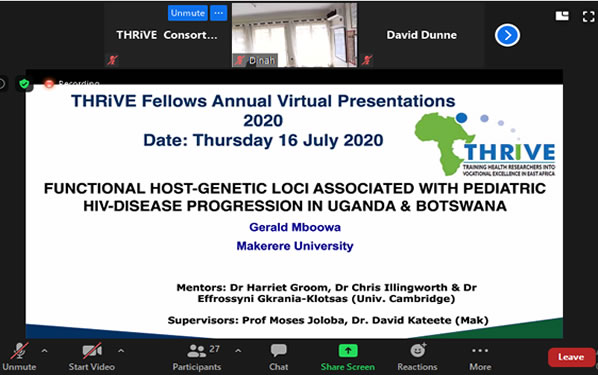
RACHEAL NINSIIMA
Before the outbreak of COVID-19, THRiVE was planning to hold face-to-face mentorship sessions between PHD fellows and their supervisors. But when the pandemic caused educational institutions to shut down and restricted physical meetings, there was need to rethink the Fellows’ Presentation and Mentorship Sessions. A seismic shift happened and the sessions went virtual. This new format offers a range of opportunities such as wider audiences and greater peer review of research.
Dr. Gerald Mboowa, a PhD fellow, had not planned to present his research to an audience beyond his supervisors and the THRiVE team. However, when COVID-19 forced THRiVE to call-off the face-to-face meetings, he had to brace himself for an online presentation to an audience of over 40 people including professors and doctors from Cambridge University and London School of Hygiene and Tropical Medicine in the UK; National Institute for Medical Research (NIMR) in Tanzania and International Centre of Insect Physiology and Ecology (icipe) in Kenya. His presentation was a smashing success and he testifies of the upside of virtual presentations.
“I had about 30 minutes to explain my research rather than the 10 we are usually assigned during face-to-face meetings and was given time to listen to and respond to a host of questions,” Dr. Mboowa said in an interview.
Although these virtual sessions might lack the intimacy of a face-to-face meeting, it’s still possible for attendees to connect with each other. Zoom (THRiVE’s digital tool of preference) provides a chat function for real-time feedback and attendees get to ask the presenter questions. Additionally, many of the fellows have been able to attend their peers’ sessions, a feat that would have been impossible if it were face-to-face. With boundaries being a non-issue, participants connect from wherever.
Furthermore, the virtual mentorship program has created a larger pool of mentors as there is more space for potential mentors to participate. For example, during Dr. Arthur Kwizera’s presentation on ‘acute respiratory failure’, he received insightful feedback and guidance from Dr. Bruce Kirenga, director of Makerere University’s Lung Institute who attended the session. Thus, the nature of this mentorship has opened up new possibilities and offered fresh perspectives for mentees.
The Inception
The sessions officially started on 9th July 2020 and have been taking place every Thursday from 11:00AM to 1:00PM. Given the urgent need to sustain mentorship of scientists in the COVID-19 era, THRiVE’s Phd/Post-doc Mentorship Committee (PPMC) thought it worthwhile to invest in virtual mentorship.
“A zoom link will be provided some days before each session. Kindly make the necessary arrangements for the presentations. It will be good for all of you to reserve time to listen to each other for support and peer mentorship. The presentations will commence next Thursday with presentations from Dr. Joel Bargul and Dr. Jovin Kitau,” reads an email that was sent to the fellows on July 3 2020.
Since these sessions were initiated, 21 PhD and postdoc fellows in Uganda, Tanzania and Kenya have been able to present their research. The number of participants on the calls has gradually risen from just about 20 at the start to about 50 currently.
Challenges
Despite the numerous benefits that have been reaped from the virtual sessions, some challenges still lurk. For example, there are incidents of poor and slow internet connections where some participants keep dropping off calls. Additionally, unlike the face-to-face meeting where discussions extend beyond the allocated time for the presentation, online meetings are time constrained and hardly allow for extended discussions.
Nevertheless, although shifting from face-to-face mentorship to electronic communication may feel abrupt, it’s a necessary transition. This virtual mentorship program will keep participants engaged and connected, while staying committed to the consortium.
